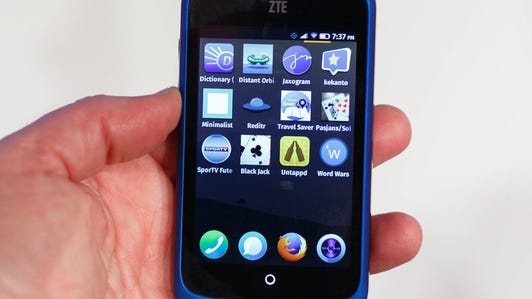BARCELONA, Spain–With another 2 billion people hooking up to the Internet in the next five years, there’s plenty of room for another mobile operating system, Mozilla Chief Executive Gary Kovacs said today in a sales pitch for his new Firefox OS.
Apple and Google have led the way in the smartphone market but can’t cover the whole thing, he said in a speech to thousands at the Mobile World Congress show here, though he didn’t mention the companies by name.
“I find it impossible to understand how 3, 4, 5, or 6 billion people are going to get their diverse needs satisfied by one or two or five companies, no matter how delicious those companies are,” Kovacs said. “Is the farmer in the Indian countryside going to have the same needs and requirements as a lawyer sitting in New York?”
Firefox OS makes its debut (pictures)






Mozilla has a mammoth challenge, though. Working in its favor is the fact that Firefox is a browser-based operating system, meaning that Web applications such as Facebook already work for it without the need for Mozilla to marshal an army of programmers to write apps.
But even that running start has its limits: even many static Web pages don’t work well on mobile browsers, and making dynamic Web apps is a lot harder. New technologies such as camera-phone interfaces and hardware-accelerated 3D graphics help, and Mozilla is pushing hard to advance those standards and spread them to other mobile browsers.
Mozilla has rounded up a solid list of Firefox OS partners, including 18 carriers across the world and handset makers LG Electronics, Huawei, ZTE, Alcatel, Geeksphone, and possibly Sony. The allies plan to bring Firefox OS to developing markets starting in the second quarter and to the United States in 2014.
The app development and distribution ecosystem of iOS and Android is strong, but Kovacs had a slogan to counter that strength: “There’s a Web for that.” Many mobile apps simply repackage data already available on the Web, he said, pointing to an example of searching for a nearby restaurant, checking reviews, looking at menus, and making reservations.
“This is the Web. We’re just taking it to mobile,” Kovacs said. “Incumbent with that is 10 million developers already ready to go.”
Related stories
- iPad Pro 2020 reviews, YouTube to throttle video quality
- Mozilla helps modernize feature phones powered by Firefox tech
- Mozilla may start offering premium services this fall
- Sticker shock over Apple’s $1,000 stand, Firefox blocking cookies
Mozilla has experience taking on big established players, too. Internet Explorer ruled the Web when Firefox grew from the ashes of the vanquished Netscape browser project about a decade ago.
“We did this 10 years ago,” Kovacs said, and Mozilla succeeded in its mission of keeping the Web open. “Today, the browser market is the most competitive it’s ever been in the history of the Internet.”
Now history is repeating itself on the mobile Web, where Firefox today is only rarely used but Google and Apple’s browsers dominate. Both those companies’ browsers are based on the WebKit browser engine, and Opera just signed up to use it, too.
“We have to make sure this shared opportunity is not something that one or two companies unnaturally control,” Kovacs said.



